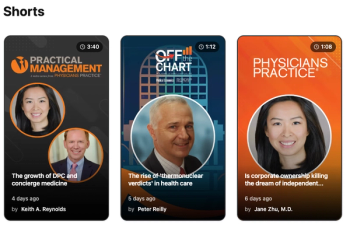
Using data to drive cost and care quality decisions
Here are three recommendations for health systems looking to improve physician engagement with data and evidence.
Large numbers of physicians have chosen hospital employment over private practice. But as many of these physicians will tell you, this doesn’t mean that they spontaneously become quality and cost champions for their health systems.
How can doctors and administrators better collaborate around key priorities related to lower costs and quality of care, particularly the selection of the drugs and devices used to treat patients? To help answer this question, Lumere recently
- Improving care quality requires giving physicians access to the richest data available
- Patient outcomes and clinical success need to be part of every conversation with physicians when discussing value-based care
- Physician payment models that tie outcomes to compensation do not necessarily ensure a sensitivity to costs of care
The need for data and evidence
Ninety-one percent of physician survey respondents indicated that gaining greater access to cost data would lead to improved quality of care, but only 40 percent said their systems were actively taking steps to do so. In practice, incorporating data into clinical decision making requires nuance. Our analysis shows a direct correlation between physician experience with managing financial performance and the influence of cost data on clinical behavior, regardless of whether the patient, the physician’s practice, or the health system is responsible for the cost.
Additionally, when we looked at the relationship between level of physician experience with managing the costs of provider care, we saw that veteran doctors generally found cost data more influential than less experienced physicians, regardless of alignment type.
Along with cost data, Lumere’s survey found physicians are increasingly likely to incorporate clinical evidence and peer-reviewed literature into their drug and device selection process-54 percent of respondents labeled it as “extremely” or “very important.” Furthermore, 56 percent believe that physicians should be involved in creating evidence-based clinical protocols, practice guidelines, and best practices at their organizations.
- Driving change at your organization
For health systems looking to improve physician engagement with data and evidence, I have three recommendations:
- Assess how information is currently shared
Conduct a thorough analysis of the current state of data management. When it comes to obtaining and sharing accurate, meaningful data, many health systems do not know where to start. Between multiple systems for collecting data, various physician needs, and an overwhelming array of available clinical evidence, the thought of developing a streamlined approach can be intimidating.
- Decide the right type and flow of data to share going forward
Ensure that physicians have a strong voice in determining what data to share and how to share it. Physicians frequently prefer a value-based approach that incorporates clinical and patient-centered outcomes. Consistent, relevant benchmarks will keep physicians focused on organizational goals.
- Compare data to existing evidence-based guidelines
While physicians have become more involved on the finance side of healthcare in recent years, successful collaboration must be aligned around patients and value-not products or price. In this patients-first approach, decisions are influenced by clinical outcomes and linked to overall clinical improvement efforts.
Success at Geisinger
Geisinger Health System, a 13-hospital system based in Pennsylvania, has worked hard to effectively engage physicians through ongoing efforts to operationalize evidence-based medicine.
In 2016, the system transformed its supply chain process, which had grown cumbersome and lacked enterprise-level oversight, with an emphasis on ensuring physician engagement by introducing evidence into the process. For example, in 2018 the team uncovered an opportunity to standardize the purchasing of devices for shoulder replacement procedures. Initially, each of the six surgeons performing shoulder procedures at Geisinger was using devices from up to 10 vendors. By reviewing the evidence with the surgeons and other key stakeholders, the system was able to determine benchmark pricing, better manage vendor claims of product differentiation, and ultimately standardize to eight vendors.
This is just one example of effectively using appropriate data and clinical evidence to improve the value of care. As the healthcare ecosystem continues to migrate to value-based care and hospitals leaders strive for new levels of physician engagement, evidence-based decision-making needs to be at the forefront.
Newsletter
Optimize your practice with the Physicians Practice newsletter, offering management pearls, leadership tips, and business strategies tailored for practice administrators and physicians of any specialty.






